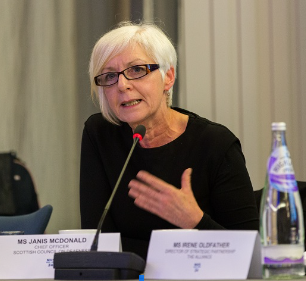Janis McDonald says a major climate change summit in Glasgow this year provides the chance to highlight inclusive communication on a global stage
Every year I have the same dream for Scotland’s one million people affected by deafness but this year the evidence suggests it may happen - for Scotland to be the first ‘Inclusive Communication’ Nation globally.
As the UK hosts COP26, the UN Climate Change Conference in Glasgow in November, there is an opportunity to make the connection with sensory loss as well as launch the initiative on a world stage. For those who may think the link is tangential, I would point out that hearing loss impacts on every aspect of our life and when those impacts extend to the wider population there is an opportunity for a universal fix.
I give the example of electric buses and cars, designed to reduce omissions, but operate silently so are a recognised threat to pedestrian safety in our cities and communities.
We depend on our hearing and/or sight to alert us to the noise of danger on the roads. The EU decided to mainstream pedestrian protection by agreeing that by 2021, all electric cars must have an acousticvehicle alert system, not just new models. Although this new device must be activated when a vehicle is reversing or travelling below 12mph, the driver can still deactivate it so a problem remains. Is it sufficient to assist those with hearing problems?
The 1246 pages of the Brexit deal may or may not include UK variations. People who are deaf sign language users, deafened, deafblind, sensory impaired and have hearing loss, are well used to adopting strategies to try and keep safe but if we all face the same dangers there will be better strategic management of road safely solutions to achieve equal impact.
We are encouraged by government to inspire action ahead of COP26 and integrating inclusive communication in all that we do - is our focus. We can build on the cross-party political support established in the management of Covid-19.
We started off with a communication deficitas most support offered during lockdown was only accessible by telephone or online. Research shows that the majority of people affected by deafness are older and do not use online technology and those who do use email to communicate. Deaf people, of all ages, don’t use the telephone but do have mobile phones to use SMS. Email and SMS were rarely available to access most support services so deaf people were excluded from the services set up to support them. As a result, Section 6 of the Coronavirus (Scotland) No 2 Act 2020 was passed so that publicly funded services communicate in an inclusive way, defined as communicating in a way that ensures individuals who have difficulty communicating (in relation to speech, language or otherwise) can receive information and express themselves in ways that best meet individual needs.
Taken together with Section 6 (7)(b) of the Consumer (Scotland) Act 2020, Section 4(2) of the Social Security (Scotland) Act 2018 and the British Sign Language (Scotland) Act 2015, we have a growing body of law to drive forward change but still it is sectoral and specific and it needs to be cross cutting and routine.
Inclusive Communication must now be at the central to the work of public bodies and publicly funded services. What this means in practice is that Inclusive Communication must be moved from “disability” to mainstream. Awareness is also key. Too often Inclusive Communication is seen as how information is produced, for example, when a paper is translated into Braille or BSL or when an Electronic Notetaker is booked for a meeting. This is, in fact, merely producing ‘accessible information’. Inclusive Communication is a dynamic and continuous process of consulting, developing, planning, delivery and review of policy, funding and services. For example, include deaf people at the start so their experience drives the detail and pace of decisions alongside others. How organisations train staff to make them aware and build their skills and knowledge of sensory loss is a key indicator that meaningful change is coming.
As 2021 unfolds, let us all agree that public, third sector and private organisations equally benefit from communicating inclusively and that Scotland can showcase its practice as well as lead other countries to seek ‘Inclusive Communication Nation Status’. deafscotland stands ready to help you deliver.
Janis McDonald is the chief officer of deafscotland








The article was interesting as it raised issues i would not have thought of such as silent electric cars. I wish you well in your campaign to communicate inclusively. However, I would also like you to campaign for more BSL training opportunities for beginners and those who need more help. Feel free to contact me.